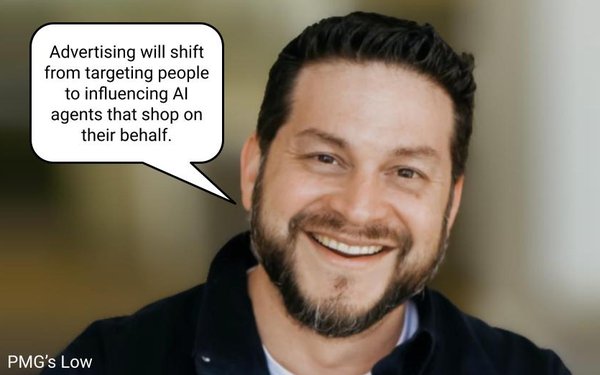
Apple, Amazon, Google, Microsoft,
Meta and others are racing to build and release AI agents that will discover, search, and purchase products and services for consumers.
This means advertisers will need to begin thinking about
advertising and marketing to AI agents. The next generation of agents -- personal assistants -- are algorithms that act on a consumer's behalf.
Many companies are not only
creating AI agents, but quantum chips that will enable computations and servers to process the requests faster and smarter.
"Digital advertising will shift from targeting people to
influencing AI agents that shop on their behalf," Paul Low, head of search at PMG, wrote in an email to MediaPost, when asked to describe what digital advertising will look like when AI agents begin
to sell to AI agents on behalf of consumers.
advertisement
advertisement
The shift, he said, means brands will need to optimize content for AI decision-making technology, likely through structured data and direct
integrations.
"Traditional search traffic may decline as AI agents bypass websites to negotiate and compare products," Low wrote in an email to MediaPost. "Companies will have to rethink how
they measure success and how they position their offerings in AI-driven marketplaces."
AI agents are becoming the next generation of shopping assistants, which Forrester Research says today
are based on one of the more commonly used applications for generative AI (GAI) in commerce search.
Among U.S. online adults who seldom or never use chat, 15% say they don't use chat
more often because responses sound too scripted or bot-like, whereas GAI in chat allows retailers to generate more dynamic responses based on terms, context, and whatever else they know about the
customer, according to a study conducted by Forrester Research.
Although it is too early to tell whether consumers will feel comfortable giving an AI agent parameters on a specific request to
search and find what they need, some ad agency marketers are thinking about how this technology will influence how they advertise and market to consumers.
The change is real and it is
coming quickly. Amazon this week announced an AI agent in Alexa+ with the relaunch.
It was reported late yesterday that Meta AI will soon become one of the social media company’s
stand-alone apps, joining Facebook, Instagram and WhatsApp.
CNBC, citing people familiar with the technology, reported Friday morning it has learned Meta CEO Mark Zuckerberg plans to release a
Meta AI stand-alone app during the second quarter of 2025.
This week Salesforce also signed a seven-year contract that will enable its customers to run the company's Agentforce AI agents
and its customer relationship management software on Google’s cloud, where the platforms can take advantage of an extensive range of data analytics products.
One of the major areas of
uncertainty for commerce shopping will be how the web will identify inquires from AI agents, compared with spam.
“AI agents will need verification systems, like digital IDs or secure API
access, to prove they represent real consumers,” Low explained. “Websites may develop trust scores for AI agents based on their behavior over time.”
He explained that without
safeguards, bad actors could exploit these systems—just as early digital advertising faced fraud and manipulation—so platforms must build in ways to detect and filter out spam or harmful
automation.
The major risk, per Low, as AI agents takeover more of the shopping journey, consumers risk losing the joy of discovery—the excitement of stumbling upon something unexpected
or feeling inspired by a brand’s story.
“Shopping could become purely transactional, making it harder for brands to build emotional connections,” he wrote. “AI also has
the potential to create more personalized, efficient, and convenient experiences. Consumers will spend less time on tedious searches and more time enjoying what truly matters.”
Angelina
Eng, IAB VP of measurement, attribution and data center, said “Google is in the search business and generates a lot of revenue from paid search, so I don’t see how they will allow that
revenue stream to disappear.”
There needs to be a balance between providing users with direct access to the information, as well as an AI-driven response, she said.
The lack of
an emotional connection will require marketers to think behavior vs. technology.
Jon Kagan, director of search and digital media strategy at Amsive, believes marketers will need to address two
experiences. One will focus on human behaviors, and the other on technology related to creative and user experience.